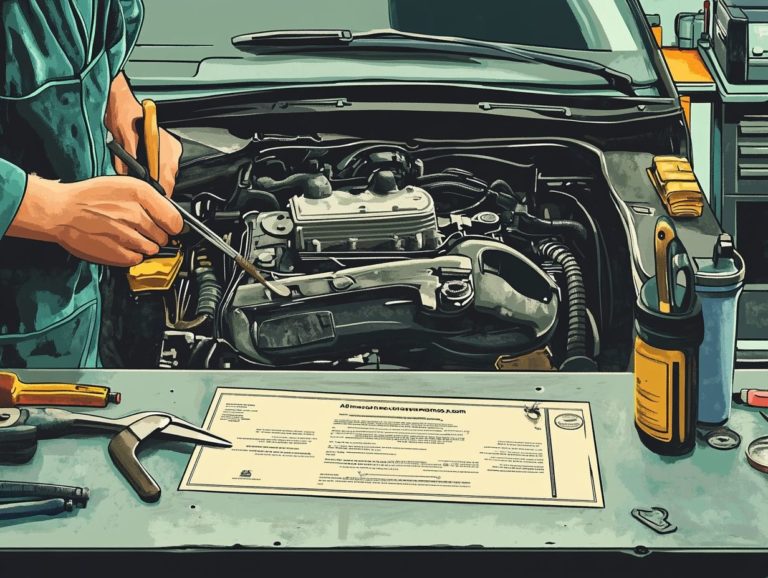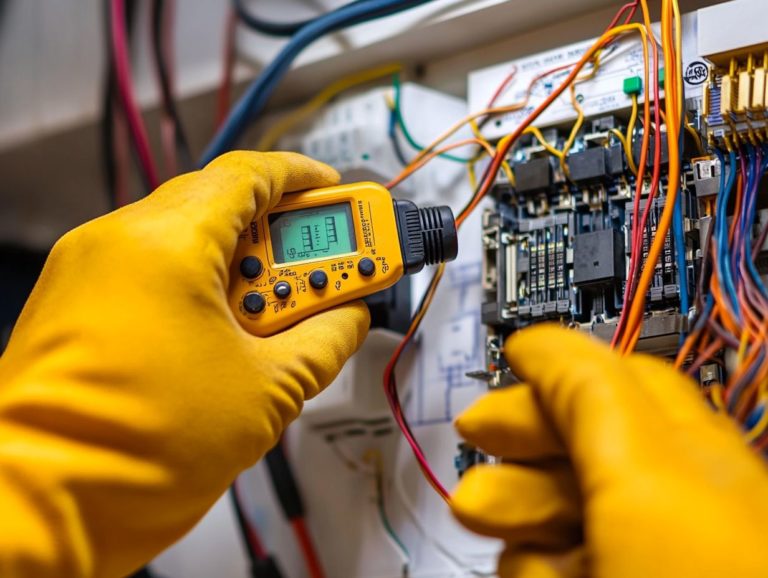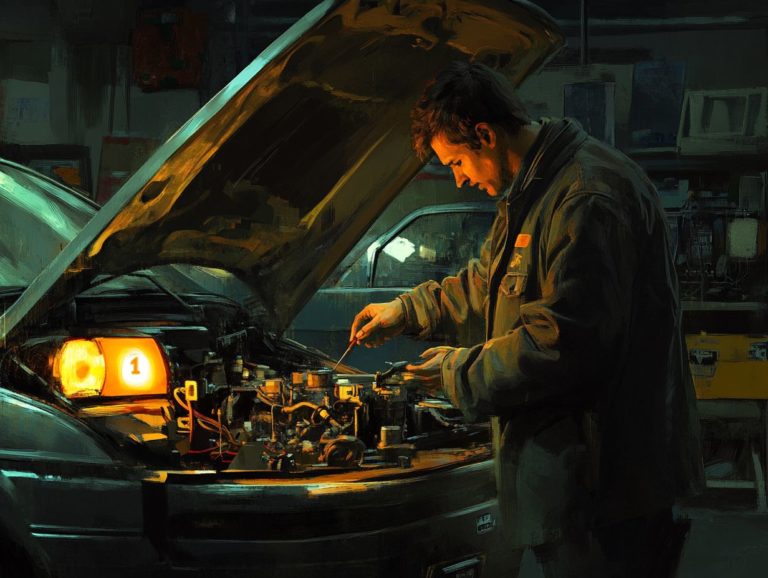5 Common Signs of Engine Trouble
Is your car trying to tell you something? Don’t ignore these crucial signs of engine trouble! Engine troubles often present themselves through subtle signs that deserve your attention.
From that persistent check engine light to unusual noises and a dip in fuel efficiency, being vigilant about these warning signs can save you both time and money.
This article highlights the five most common indicators of engine trouble, delves into their underlying causes, and provides you with valuable tips to prevent future issues.
Get ready for a smoother ride let s dive in!
Contents
- Key Takeaways:
- 1. Check Engine Light Is On
- 2. Strange Noises Coming from the Engine
- 3. Engine Is Running Rough or Stalling
- 4. Decreased Fuel Efficiency
- 5. Smoke or Unusual Smells Coming from the Engine
- What Does the Check Engine Light Indicate?
- What Are the Most Common Causes of Engine Troubles?
- How Can Regular Maintenance Help Prevent Engine Troubles?
- What Are the Different Types of Engine Troubles and Their Symptoms?
- When Should a Professional Mechanic Be Consulted for Engine Troubles?
- How Can One Prevent Engine Troubles from Occurring in the Future?
- Frequently Asked Questions
- What are the 5 most common signs of engine trouble?
- What kind of strange noises can indicate engine trouble?
- Why is difficulty starting a sign of engine trouble?
- How does decreased performance indicate engine trouble?
- Should I be concerned if my warning lights come on?
- What unusual smells could be a sign of engine trouble?
Key Takeaways:
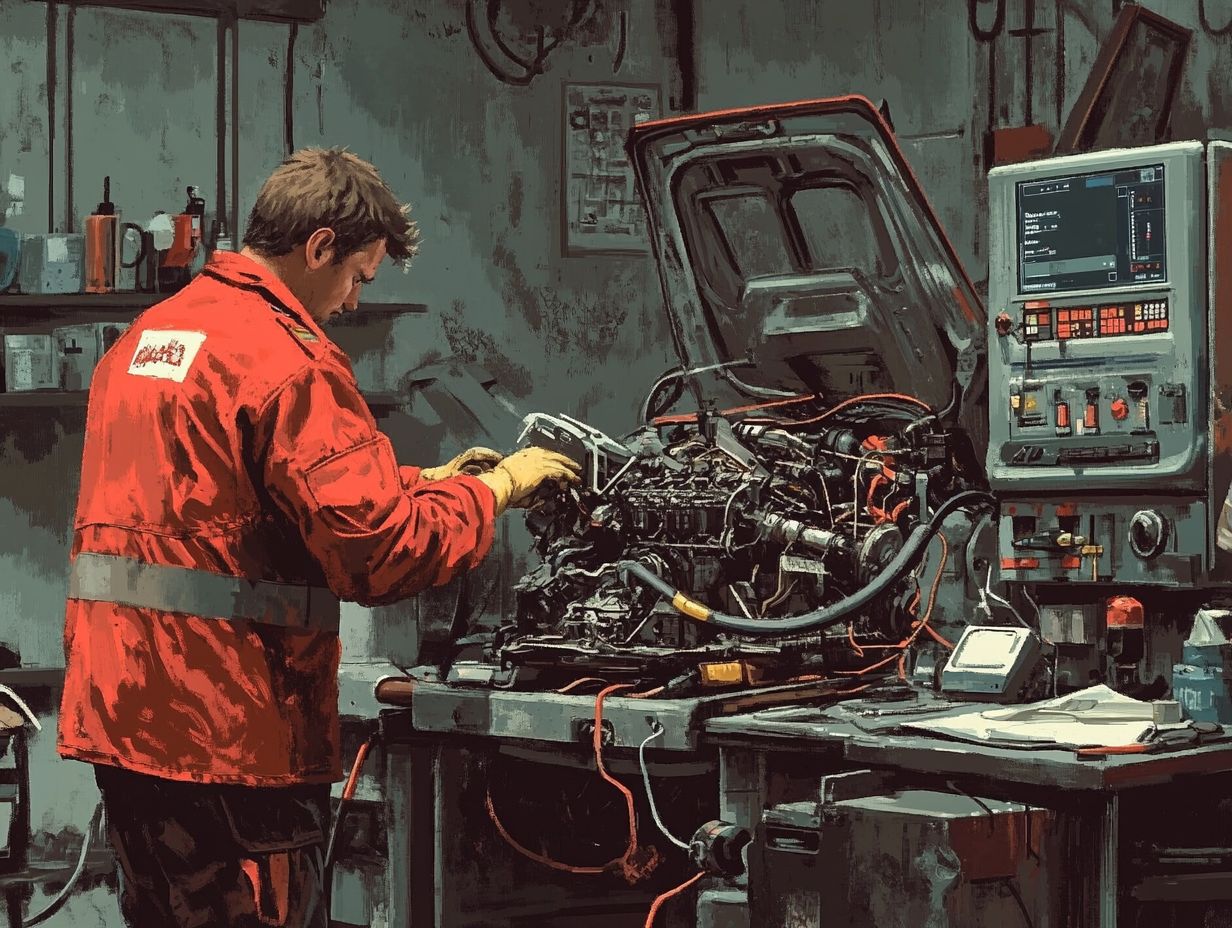
- If your check engine light is on, it could indicate a variety of engine issues and should not be ignored.
- Strange noises, rough running, and stalling are all signs of potential engine trouble that should be addressed immediately.
- Decreased fuel efficiency and smoke or unusual smells from the engine are also common signs of engine trouble that should not be ignored.
1. Check Engine Light Is On
The activation of the Check Engine Light on your dashboard can signal a range of underlying issues within your car’s engine, from minor inconveniences to serious problems that may call for immediate attention from a qualified mechanic. This essential warning system is part of your vehicle’s onboard diagnostics system (OBD II), designed to monitor critical functions and alert you when something is off.
When that light flickers to life, it might indicate problems like an engine misfire, where one or more cylinders struggle to ignite properly, or fuel delivery issues that could be hampering your engine’s performance. It could also hint at a malfunctioning oxygen sensor, which negatively impacts your vehicle’s fuel efficiency and emissions.
To accurately diagnose these potential issues, a diagnostic test using an OBD II scanner becomes invaluable. This device retrieves error codes that pinpoint specific malfunctions, giving you the power to address concerns swiftly and prevent further complications that could lead to costly repairs.
2. Strange Noises Coming from the Engine
Unusual noises coming from your engine often signal underlying mechanical issues, such as vibrations or engine knocking, that require immediate attention to prevent further damage to your vehicle.
These peculiar sounds can take on various forms, including:
- Grinding, which suggests a possible problem with the bearings or timing belt,
- Rattling, indicating loose components or a failing exhaust system,
- Hissing, which may point to a vacuum leak or coolant issue.
Recognizing these warning signs is vital for maintaining your vehicle s health. When these noises arise, it’s essential for you to consult a mechanic who can perform a comprehensive inspection. Ignoring these symptoms could lead to more severe problems and costly repairs in the future.
3. Engine Is Running Rough or Stalling
Experiencing a rough idle or engine stalling can be incredibly frustrating, and it may signal serious performance issues that, if left unchecked, could lead to engine failure. Immediate attention is crucial.
These symptoms often arise from a range of underlying causes. For instance, faulty spark plugs might struggle to ignite the fuel-air mixture effectively, or there could be issues with the fuel injection system that prevent the correct amount of fuel from reaching the engine. Clogged fuel filters can restrict flow and cause performance issues, ultimately compromising both efficiency and smooth operation.
To accurately diagnose these concerns, a thorough engine diagnostic scan is highly recommended. By utilizing specialized tools, mechanics can pinpoint the specific issue whether it s a misfire caused by spark plug wear or a fuel delivery complication ensuring that repairs are both targeted and effective.
4. Decreased Fuel Efficiency

A drop in fuel efficiency raises red flags about engine issues. These problems can hurt your vehicle’s performance and increase fuel costs.
Factors like a failing fuel pump can disrupt gasoline flow, leading to inefficient combustion. Clogged air filters can also limit airflow, forcing the engine to consume more fuel.
Other culprits include oxygen sensors that don t work properly, sending incorrect data to the engine. This can worsen fuel inefficiency.
Regular inspections are key. Consulting a reliable mechanic early can help restore fuel efficiency and keep your vehicle running smoothly.
5. Smoke or Unusual Smells Coming from the Engine
Smoke or strange smells from your engine signal urgent problems. These might include a coolant leak or emissions issues needing immediate attention.
Different smoke types provide clues. For example, white exhaust smoke often means coolant is leaking into the engine, risking overheating. Meanwhile, black smoke suggests too much fuel consumption, hinting at a fuel system issue.
Spotting these signs quickly can save you money on repairs. If you notice any unusual smoke, consult a mechanic right away.
What Does the Check Engine Light Indicate?
The Check Engine Light is your vehicle’s alert system. It signals possible issues, from minor glitches to serious problems that need a professional.
This light can come on for various reasons, such as issues with the oxygen sensor or spark plugs. Each of these requires careful examination.
Some may be tempted to reset the light. However, a comprehensive diagnostic assessment is more valuable. A qualified mechanic can identify and fix the root problems, ensuring your vehicle runs well for longer.
What Are the Most Common Causes of Engine Troubles?
Engine troubles can arise from various issues. Common problems include engine misfires, fuel delivery issues, and malfunctions in key components like the catalytic converter or EGR valve.
These issues come with specific symptoms. For instance, an engine misfire might cause a shaky idle or loss of power during acceleration.
Being aware of these signs encourages timely action. Catching minor issues early can prevent costly repairs and extend your engine’s life.
How Can Regular Maintenance Help Prevent Engine Troubles?
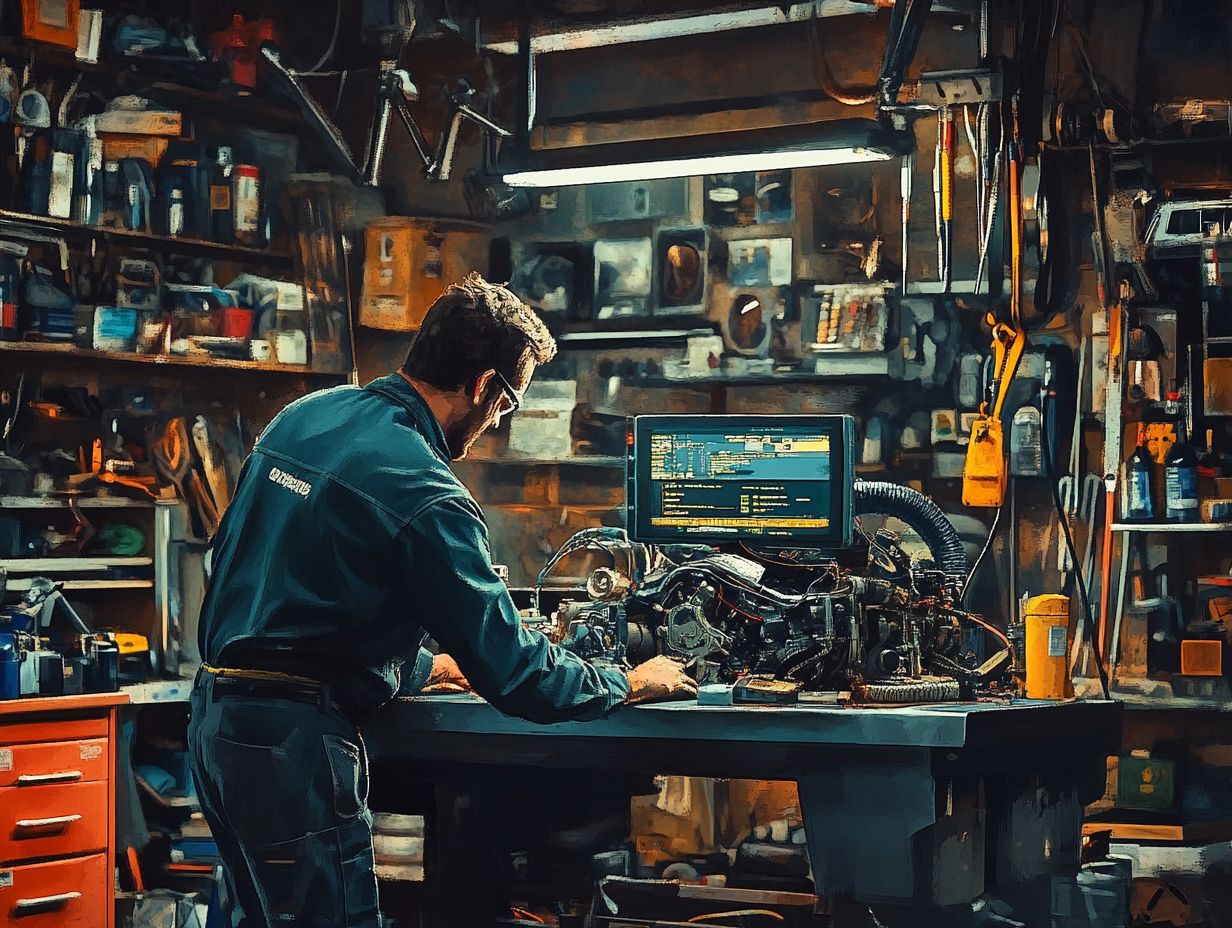
Adhering to a regular maintenance schedule is essential for preventing engine troubles and ensuring optimal performance. It also extends the lifespan of your vehicle.
By prioritizing oil changes and filter replacements, along with thorough mechanical inspections, you can create a buffer against unexpected malfunctions. These routine checks boost fuel efficiency and protect crucial engine components from wear and tear.
Neglecting these vital tasks may lead to costly repairs. Minor issues can snowball into significant engine problems over time. Therefore, consistent upkeep is essential and can save you both money and stress in the long run.
What Are the Different Types of Engine Troubles and Their Symptoms?
Understanding the various types of engine troubles and their symptoms is crucial for effective diagnostics and timely intervention by a qualified mechanic.
Engine issues can manifest in distinct ways. You might notice performance problems as a loss of power or acceleration, signaling that something may be wrong. Stalling is another serious concern, often marked by a sudden loss of engine power while driving, which can induce panic. Rough idling, characterized by vibrations or noises when your vehicle is stationary, hints at deeper issues like misfires (when the engine doesn’t fire correctly) or fuel delivery problems.
Recognizing these warning signs can improve your chances of prompt diagnosis and repair, especially when it comes to 5 signs you need to visit a mechanic for any engine complications.
When Should a Professional Mechanic Be Consulted for Engine Troubles?
Consulting a professional mechanic is wise when you encounter persistent engine problems that basic troubleshooting cannot resolve. If warning signs like the Check Engine Light or unusual noises appear, it’s crucial to get help immediately.
These situations suggest there’s more going on than simple maintenance can fix, making it important to seek expert assistance. Ignoring these symptoms can lead to severe damage, resulting in skyrocketing repair costs and prolonged downtime.
A skilled mechanic can use advanced engine tests to analyze your vehicle’s systems, identifying issues that may not be immediately visible. By employing specialized tools and their expertise, they can efficiently tackle complex problems, ensuring your vehicle remains operational and safe for the road.
How Can One Prevent Engine Troubles from Occurring in the Future?
Preventing engine troubles relies on proactive vehicle maintenance and an understanding of your engine’s inner workings. This enables you to address potential issues before they escalate.
Incorporating regular inspections lets you catch minor problems early. Sticking to a diligent maintenance schedule is crucial; don t forget oil changes, coolant checks, and filter replacements.
Equally important is your vigilance regarding any warning signs your vehicle may present, such as unusual noises or dashboard alerts. These can indicate underlying issues needing immediate attention. Staying informed about common automotive problems and seeking professional help when needed empowers you to keep your vehicle in peak condition, helping you avoid unnecessary breakdowns and expenses.
Frequently Asked Questions
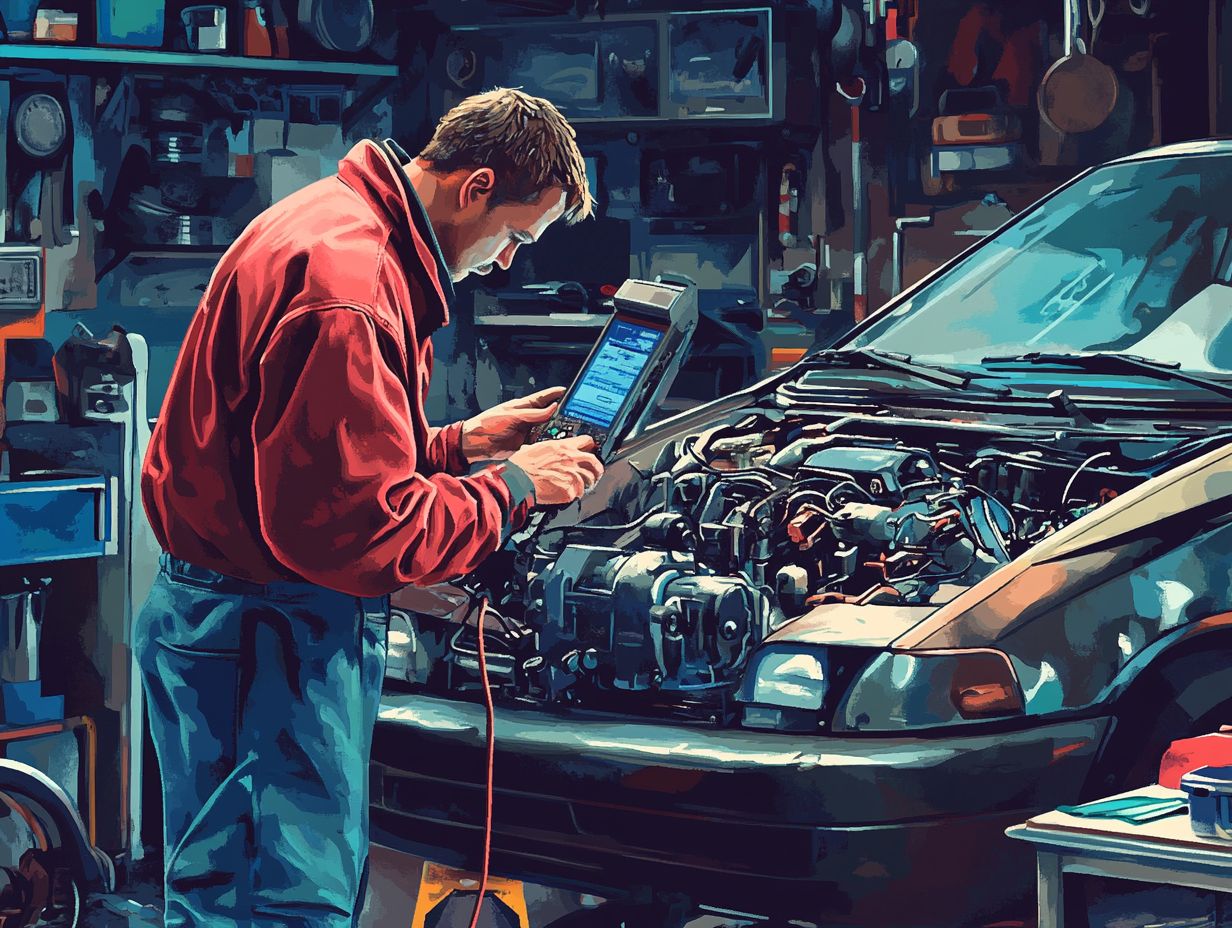
What are the 5 most common signs of engine trouble?
The 5 warning signs of common engine problems are strange noises, difficulty starting, decreased performance, warning lights, and unusual smells.
What kind of strange noises can indicate engine trouble?
Strange noises like knocking, grinding, or hissing can indicate problems with the engine, such as damaged bearings, worn belts, or a leak in the exhaust system.
Why is difficulty starting a sign of engine trouble?
Having trouble starting your engine? This could mean you have a weak battery, a faulty starter, or issues with your fuel system.
How does decreased performance indicate engine trouble?
If your car struggles to accelerate or uses more fuel, it may signal engine problems. Common culprits include a blocked fuel filter or dirty spark plugs.
Should I be concerned if my warning lights come on?
Yes! Warning lights like the check engine light or oil pressure light can warn you of various issues. Some might be minor, like a loose gas cap, while others could be serious.
What unusual smells could be a sign of engine trouble?
Smells like burning rubber, oil, or coolant are red flags. These odors can indicate leaks or overheating, so it’s important to check them out.

